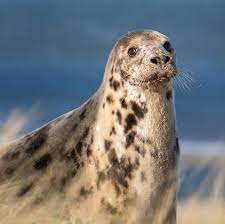50 Reasons To Be Cheerful In 2021
BBC Wildlife
|January 2021
In the face of a devastating pandemic, organisations across the globe have continued to do battle for our most precious species and habitats. As we leave 2020 behind and look forward to a more positive year ahead, it’s time to celebrate their successes.


1 SEAL CELEBRATIONS
The grey seals at Norfolk’s Blakeney National Nature Reserve have had another strong year. The first pup was spotted there in 1988, and the site has since flourished to become the biggest colony in England. The number of young has burgeoned from just 25 in 2001 to a whopping 3,399 in 2019, a result of low levels of disturbance and mortality during the first key weeks of life, and lack of natural predators. Autumn 2020 again predicted about 4,000 new arrivals – so many that rangers are having to change the way they count. nationaltrust.org.uk

2 TENERIFE A TOP SITE FOR WHALES
In February 2021, the pristine waters of Franja Marina Teno-Rasca, south Tenerife, are set to become Europe’s first Whale Heritage Site. The area has long been popular with whale-watchers, boasting 28 species of cetacean, including a resident population of short-finned pilot whales. Whale Heritage Site status is granted to outstanding destinations where cetaceans are embraced through the cultural, economic, social and political lives of their associated communities, and where people and cetaceans co-exist in an authentic and respectful way. whaleheritagesites.org; worldanimalprotection.org.uk

3 VERGE VICTORIES
Denne historien er fra January 2021-utgaven av BBC Wildlife.
Abonner på Magzter GOLD for å få tilgang til tusenvis av kuraterte premiumhistorier og over 9000 magasiner og aviser.
Allerede abonnent? Logg på
FLERE HISTORIER FRA BBC Wildlife

BBC Wildlife
"I was terrified the elephant would ram us"
African elephant in Kenya
2 mins
January 2026

BBC Wildlife
ALL YOU EVER NEEDED TO KNOW ABOUT THE Fennec fox
THE FENNEC FOX IS THE SMALLEST fox in the world, with a body length that can be as little as 24cm.
3 mins
January 2026

BBC Wildlife
INTO THE PLASTISPHERE
A unique synthetic ecosystem is evolving in our oceans – welcome to the plastisphere
7 mins
January 2026

BBC Wildlife
“More than half of all animal life exists in a parasitic relationship, and all life lives in symbiosis”
Our survival depends on species evolving to live together - but some relationships take dark turns
7 mins
January 2026

BBC Wildlife
Are animals able to dream?
SLEEP IS A MYSTERIOUS THING. FOR A long time, we weren't sure why we do it.
1 mins
January 2026

BBC Wildlife
Does a cuckoo know it's a cuckoo?
ABSURD LITTLE BIRDS ACROSS THE world lay their eggs in the nests of other species, leaving the hapless parents to raise a changeling at the expense of their own offspring.
2 mins
January 2026

BBC Wildlife
Orcas killing young sharks
Juvenile great whites are easy prey for orca pod
1 mins
January 2026

BBC Wildlife
Ocean goes on tour
Acclaimed film touring the UK, backed by live orchestra and choir
1 min
January 2026

BBC Wildlife
Feisty bats hunt like lions
Winged mammals use a 'hang and wait' strategy to take down large prey
1 mins
January 2026

BBC Wildlife
SNAP-CHAT
Richard Birchett on magical merlins, wily coyotes and charging deer
2 mins
January 2026
Translate
Change font size

